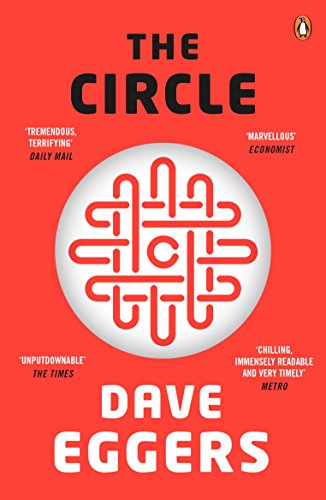Big mistake.
Having just completed this excellent and page-turning satire, I returned to those very reviews. Some were autistic (fatally flawed - he gets details of the technology wrong); some were literary-snobbish (his writing is flawed, the characters are flat and unconvincing); and some were patronising (politically flawed, could never happen, nothing to see here - move on).
 |
| Amazon link |
But some people called it right, Steven Axelrod being my outstanding favourite.
Here's how he starts:
"Reading Dave Eggers’ new novel The Circle an image slipped into my mind, one not contained in the book but which I’m sure its protagonist would appreciate: a big church wedding with full Catholic ceremony – the priest in his vestments, bathed in the densely colored sunlight from the rose window, holding a massive Bible before a crowd of hundreds of friends and family as the sacred catechism rolls up the nave and echoes from the flying buttresses of the medieval ceiling. “Do you take this woman …” and the man answers “I do.”Mae Holland is a 2013 portrait of a type we've become more familiar with, the ingenue social-justice warrior, insistent upon giving us all the benefits of her inexperience.
Then he turns to the bride. “Do you, Emily Johnson, take this man, Brad Halpern, to be your lawfully wedded husband, to have and to hold …”
When he’s done, she looks up distracted.
“What?”
She’s been texting.
The only problem Mae Holland, the heroine of The Circle would have with this scenario is that Emily hadn’t “gone clear” – she had no portable camera attached to herself which could document every moment of the ceremony to her 239,456 followers.
She wasn’t “zinging” them all (a kind of instant tweet), acknowledging their “smiles” and good wishes as they came in. What was wrong with Emily? Why wasn’t she sharing this beautiful moment? Who made her dress? Where did Brad get his tuxedo? Does the church do charity work?
Couldn’t she link to the designer and the haberdashery and the Catholic aid organization? Think how her Conversion Rate (that’s the number of purchases you stimulate with your comments and zings and links) could be sky-rocketing! Not to mention her Retail Raw – that’s “the total gross purchase price of recommended products” people have purchased because of you. What a waste!
Doesn’t Emily understand that sharing is caring and secrets are lies and most of all – privacy is theft?"
In Axelrod's words,
"One of the most audacious aspects of Eggers’ book is that the writing sticks rigorously with Mae Holland’s point of view. The narration is as close as “close third person” can get. Why not tell it in first person then? But that’s the whole point: that pesky “first person” is precisely what the Circle is trying to eradicate."The Circle" is not a prediction of a Google-Facebook future: real life is way too conflicted for that. Instead it conjures up a certain kind of utopian vision, one where everyone is nice, everyone loves and affirms everyone else all the time, everything works and there is no unpleasantness of any kind.
Because Mae doesn’t understand what’s happening to her and her world, the reader is forced to make the arguments that she can’t. The novel becomes interactive in a way that no computer program could ever be. You’re literally shouting at the page. When Mae talks about basic principles with Eamon Bailey, one of the three Wise Men who founded the company, she swallows his specious arguments whole.
All secrets are bad because anything private is suspect – why would we hide something we weren’t ashamed of? Mae doesn’t have the presence of mind or the education to point out that most of the great strides forward in human history – including the basic technical work that created the Circle itself – was done in silence and solitude.
Human beings need isolation and quiet and uninterrupted thought. Physical health and sanity depend on it. The idea that we only hide what we’re ashamed of is simply false. But Mae doesn’t get it. She loves being part of something bigger than herself, having her tastes and opinions influencing the world, seeing her face in the mirror of a million hard drives."
[There's always an implicit, passive-aggressive 'or else' hanging in the air].
This is the left-liberal dream, an SJW paradise: the final triumph of the superego.
And yet such a cultish community of doves is totally open to manipulation by those less scrupulous. The transparent shark swirls in the sociopathic CEO's aquarium.
"The world of doves is not evolutionarily stable. Power corrupts, and those constrained to become doves are transformed rapidly into victims.".. as I observed in my review of "Gnomon".
---
So now two juxtaposed discussions of novels critiquing the socially-liberal dream. What gives?
Well, Amazon noticed my interest in "Gnomon" and promptly recommended "The Circle".
Yes, I'm living the dream.
---
Some of the reviews pointed out that in the novel, due to The Circle's technology, crime is reduced and welfare is actually improved. Seems silly to deny it.
Eggers' authorial-viewpoint characters try to locate what is actually bad about The Circle. It's harder than one might imagine. Isn't total surveillance much like vaccination? Necessarily total for the greater good?
The best they can do is to highlight the increasing levels of compulsion to sign into The Circle's total environment. But is the only alternative to The Circle's cult some kind of (ineffectual) off-grid survivalism?
We'll have to improve on that. I can do no better than effective checks and balances.
No comments:
Post a Comment
Comments are moderated. Keep it polite and no gratuitous links to your business website - we're not a billboard here.